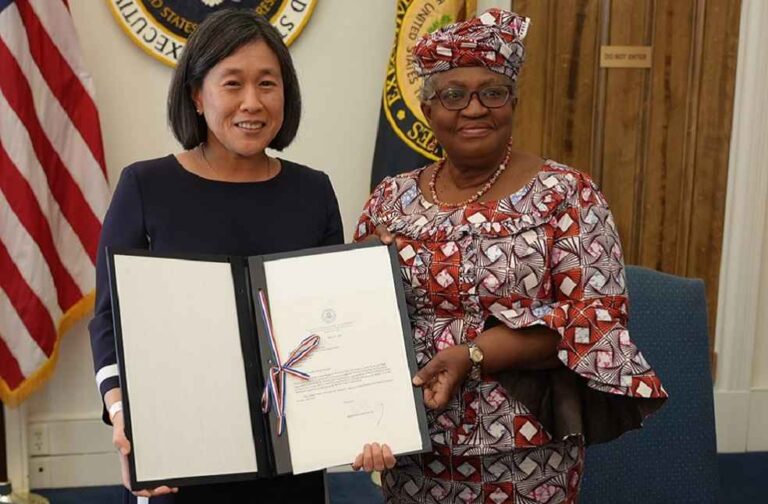The United States has officially accepted the Agreement on Fisheries Subsidies for Ocean Sustainability, marking a significant milestone towards the agreement’s entry into force. The US became the fourth member of the World Trade Organization (WTO) to deposit its instrument of acceptance for the landmark agreement, which aims to promote ocean sustainability by setting new multilateral rules to curb harmful subsidies.
The Director-General of the WTO, Ngozi Okonjo-Iweala, received the instrument of acceptance from US Trade Representative Ambassador Katherine Tai during a ceremony in Washington, D.C. The acceptance of the agreement by the US, a large fishing nation, is considered a pivotal moment in the effort to ensure the agreement enters into force. The agreement requires acceptance from two-thirds of WTO members for it to come into effect.
In her statement, DG Okonjo-Iweala expressed her delight and gratitude for the US’s formal acceptance of the Agreement on Fisheries Subsidies. She praised the US for its leadership in protecting the environment and promoting ocean sustainability, stating that US leadership is vital to the WTO and to multilateralism. She also expressed her commitment to working with the US to ensure the WTO responds to the needs of people and the planet.
US Trade Representative Katherine Tai also welcomed the agreement, stating that the US has been a leader in protecting the environment from harmful and unsustainable practices, including the oceans and marine resources. She expressed her pride in being among the first WTO members to accept the agreement, which she described as the first ever multilateral trade agreement with environmental sustainability at its core. She also highlighted the agreement’s potential to improve the lives of fishers and workers in the US and elsewhere.
The Agreement on Fisheries Subsidies was adopted by consensus at the WTO’s 12th Ministerial Conference held in Geneva in June 2022. It aims to address the widespread depletion of the world’s fish stocks by curbing harmful subsidies. The agreement also recognizes the needs of developing and least-developed countries (LDCs) and establishes a Fund to provide technical assistance and capacity building to help them implement the obligations. The agreement prohibits support for illegal, unreported and unregulated (IUU) fishing, bans support for fishing overfished stocks, and ends subsidies for fishing on the unregulated high seas.
The agreement has been hailed as a significant step towards promoting ocean sustainability, and its entry into force is eagerly anticipated by advocates of environmental protection. With the US’s acceptance of the agreement, momentum is building among WTO members towards achieving the two-thirds acceptance threshold required for the agreement to come into effect.
MOST POPULAR: SINGAPORE BECOMES FIRST COASTAL STATE TO ACCEPT WTO AGREEMENT ON FISHERIES SUBSIDIES



